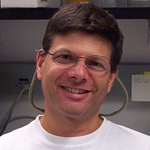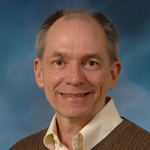Two leading members of the faculty at Washington University School of Medicine in St. Louis have been named Alan A. and Edith L. Wolff Professors in their respective fields. Raphael Kopan, PhD, has been named the Wolff Professor of Developmental Biology, and David Sibley, PhD, has been named the Wolff Professor of Molecular Microbiology.
“The generosity of Alan and Edith Wolff continues to benefit Washington University and has already contributed to the discovery of new knowledge in the field of medical science,” says Washington University Chancellor Mark S. Wrighton. “Their philanthropic support will provide recognition and financial support for two outstanding scientists who are at the forefront of important areas in medical research.”
Kopan and Sibley were installed as Wolff Professors by Wrighton and Larry J. Shapiro, MD, executive vice chancellor for medical affairs and dean of the School of Medicine.
“Raphael Kopan’s research is revealing new details of how an important protein guides the development of many of the body’s tissues,” Shapiro says. “David Sibley studies a common parasite’s role in causing illness, helping develop new insights into its deadly microbial sibling, the malaria parasite.”

Kopan earned a bachelor’s degree in biology in 1981 and a master’s degree in zoology in 1984, both from Tel Aviv University. He later earned a doctorate in molecular genetics and cell biology at the University of Chicago.
After postdoctoral training at the Fred Hutchinson Cancer Research Center in Seattle, he came to Washington University in St. Louis as an assistant professor of medicine and of molecular biology and pharmacology. Kopan studies a protein called Notch that is instrumental in guiding embryonic cells’ development into the body’s many tissue types. Because Notch is present in so many cell types, Kopan’s lab has contributed to medical research across an array of disciplines, from Alzheimer’s disease to asthma to cancer.
“It’s a wonderful honor to be receiving this Wolff professorship,” Kopan says. “I’m grateful that Alan and Edith Wolff chose to help ensure that creative activity in biomedical research continues.”

Sibley earned a bachelor’s degree in biology in 1978 from Oberlin College and a doctorate in zoology and physiology from Louisiana State University in 1985. He was a research scientist at the U.S. Public Health Service’s National Hansen’s Disease Center in Carville, La., for two years, and then was a postdoctoral fellow in Stanford University’s Department of Microbiology and Immunology. Sibley was recruited as an assistant professor of molecular microbiology by Washington University School of Medicine in 1991 and was promoted to full professor in 2002.
Sibley’s lab focuses on Toxoplasma gondii, a parasite that may infect as many as one in every four humans. The parasite rarely causes symptoms but can become a potentially life-threatening infection if the immune system is weakened by illnesses such as HIV or is suppressed to facilitate an organ transplant.
Sibley’s studies reveal how Toxoplasma and its relatives, including the malaria parasite Plasmodium falciparum, infect cells in the human body and hence cause disease.
“I’m thrilled to receive this new professorship,” Sibley says. “It’s nice to get recognition for the research we do, which is very basic in nature. We hope that the insights we produce will help the efforts of more clinically-oriented researchers seeking to develop new treatments, and it is great to receive this recognition of the value of our work.”
The late Alan and Edith Wolff supported medical research at the School of Medicine for more than three decades. In the late 1940s, Alan Wolff founded Wolff Construction Co., a real-estate development, investment and management company. The company built shopping centers in Missouri, Illinois and Kansas through the ‘50s and ‘60s.
Edith Wolff became company president after Alan Wolff’s death in 1989. Under her direction, the company focused on real-estate investment, management and leasing of commercial property.
In 2007, Edith Wolff gave $20 million to Washington University School of Medicine to establish the Alan A. and Edith L. Wolff Institute, supporting biomedical research projects leading to the prevention, treatment and cure of disease.
The Wolff philanthropic legacy also supports two other endowed professorships, the Alan A. and Edith L. Wolff Professorship in Medicine, held by Daniel C. Link, MD, professor of pathology and immunology, and the Alan A. and Edith L. Wolff Distinguished Professorship in Medicine, held by William A. Peck, MD, former executive vice chancellor and dean of the School of Medicine and now director of the university’s Center for Health Policy.
In addition to supporting research, Edith Wolff established the Edith L. Wolff Scholarship-Loan fund, a non-interest-bearing fund for medical students.
To recognize her extraordinary support of life-saving medical research, Edith Wolff received an honorary doctorate from the university in 2004. She died in 2008 at age 93.
Washington University School of Medicine’s 2,100 employed and volunteer faculty physicians also are the medical staff of Barnes-Jewish and St. Louis Children’s hospitals. The School of Medicine is one of the leading medical research, teaching and patient care institutions in the nation, currently ranked fourth in the nation by U.S. News & World Report. Through its affiliations with Barnes-Jewish and St. Louis Children’s hospitals, the School of Medicine is linked to BJC HealthCare.